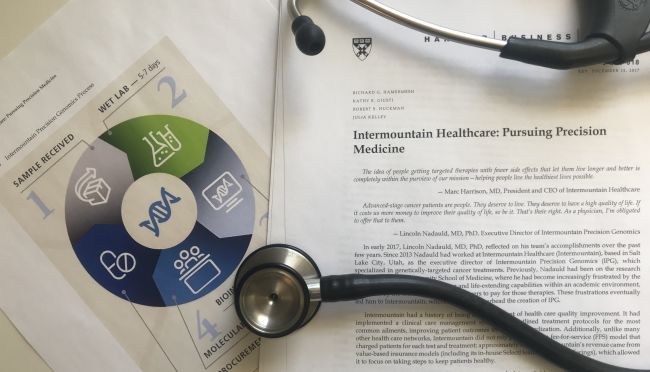Collaborative Innovation and Invention →
→

- 16 Mar 2023
- Research & Ideas
Why Business Travel Still Matters in a Zoom World
Meeting in person can make all the difference for colleagues from different time zones or cultural backgrounds. A study by Prithwiraj Choudhury traces flight patterns among 5,000 airports around the world to show how business travel propels innovation.

- 08 Feb 2023
- Op-Ed
Building an Inclusive Workplace? Prepare to Shield It from Economic Fears
Mixed economic signals have many worrying about what's to come. Distracted leaders could lose sight of their inclusion and belonging goals to the detriment of future innovation. But it doesn't have to be this way, say Hise Gibson and Nicole Gilmore.

- 24 Feb 2020
- Research & Ideas
The Hidden Vulnerabilities of Open Source Software
The increasing use of open source software in most commercial apps has revolutionized software development—but also created hidden vulnerabilities, say Frank Nagle and Jenny Hoffman. Open for comment; 0 Comments.

- 21 Jul 2019
- Working Paper Summaries
Why Do User Communities Matter for Strategy?
Communities of users are shaping the industrial landscape and contributing to the innovations we use every day. The effects of user communities on firms, industries, and society will continue to grow. This article discusses the relationship between user communities and firms to shed light on avenues for future research in business strategy.

- 18 Apr 2019
- Research & Ideas
Open Innovation Contestants Build AI-Based Cancer Tool
Radiation oncologists are few in number, especially if you are nowhere near a cancer facility. Could artificial intelligence be used to deliver an oncologist's skills for radiation therapy? Karim R. Lakhani discusses a unique open innovation experiment. Open for comment; 0 Comments.

- 26 Mar 2019
- Working Paper Summaries
Managed Ecosystems and Translucent Institutional Logics: Engaging Communities
Organizations increasingly rely on engagement with external communities of contributors. This paper explores transitions to a managed-ecosystem governance mode and its implications for strategy and innovation. To be successful, firms must develop the capabilities to shepherd communities, leverage without exploiting them, and share intellectual property rights.

- 21 Mar 2019
- Working Paper Summaries
Advancing Computational Biology and Bioinformatics Research Through Open Innovation Competitions
Crowdsourcing is a way for many individuals to address a common problem. This paper describes the design and outcomes of three crowdsourcing contests focused on algorithms for 1) clustering antibody sequences, 2) imputing gene expression measurements, and 3) performing fast queries on a particular dataset. Innovation through contests greatly improved the solutions available.

- 21 Mar 2019
- HBS Case
The Ferrari Way
Secretive sports car maker Ferrari opens up to Stefan Thomke about how it has bucked industry trends to achieve success. Open for comment; 0 Comments.

- 28 Feb 2019
- Cold Call Podcast
Pursuing Precision Medicine at Intermountain Healthcare
What happens when Intermountain Healthcare invests resources in an innovative precision medicine unit to provide life-extending, genetically targeted therapies to late-stage cancer patients? Professors Richard Hamermesh and Kathy Giusti discuss the case and its connections to their work with the Kraft Precision Medicine Accelerator. Open for comment; 0 Comments.

- 12 Nov 2018
- Research & Ideas
'Always On' Isn't Always Best for Team Decision-Making
Is it possible for teams to communicate too frequently? Research by Ethan Bernstein and colleagues suggests that groups that meet less often may be better at problem-solving. Open for comment; 0 Comments.

- 18 Jul 2018
- Research & Ideas
No More General Tso's? A Threat to 'Knowledge Recombination'
Immigrants bring with them innovations from their homelands, knowledge that local inventors often build upon, says Prithwiraj Choudhury. Examples: turmeric medicine, double-entry bookkeeping, and American Chinese food. Open for comment; 0 Comments.

- 27 Sep 2017
- Research & Ideas
What Happens When Ordinary People Get Creative?
Move over, creative geniuses. Teresa Amabile says the world needs to pay more attention to the creative processes of everyday people, especially in an age when big ideas often come from the crowdsourced masses. Open for comment; 0 Comments.

- 31 Jul 2017
- Working Paper Summaries
In Pursuit of Everyday Creativity
This paper describes the most compelling research trends around creativity and innovation. It suggests that 1) creative behavior of ordinary individuals is likely to become more important to the development of products and services, and 2) future studies should focus on such creative behavior—and related psychological states and environmental contexts—as it happens.

- 20 Jun 2017
- Working Paper Summaries
Conversational Peers and Idea Generation: Evidence from a Field Experiment
To develop a theory of innovator capability, this study extends existing research linking personality and creativity to take into account the social nature of idea generation. Using data from an experiment embedded in a bootcamp for aspiring entrepreneurs, results show that better ideas are generated by “open” innovators exposed to extroverted peers. Extroverts provide more raw information that innovators high in openness are best able to recombine into novel ideas.
- 20 Mar 2017
- Book
Why Companies Are Placing Users at the Core of Their Innovation Strategies
In his recent edited volume Revolutionizing Innovation, Karim Lakhani brings together the latest thinking around open innovation, users, and communities. Open for comment; 0 Comments.

- 09 Mar 2017
- Cold Call Podcast
IDEO is Changing the Way Managers Think About Thinking
IDEO’s human-centered design thinking is a systematic approach used to help create new products and services. Professor Ryan Buell explores this process as a leading movie cinema chain in Peru rethinks the movie-going experience. Open for comment; 0 Comments.
- 19 May 2016
- Research Event
Crowdsourcing, Patent Trolls, and Other Research Insights Highlighted at Harvard Business School Symposium
The 2016 Faculty Research Symposium looked at current and potential collaborations between HBS and Harvard's School of Engineering and Applied Sciences. Open for comment; 0 Comments.
- 23 May 2012
- Research & Ideas
Five Ways to Make Your Company More Innovative
How do you create a company that unleashes and capitalizes on innovation? HBS faculty experts in culture, customers, creativity, marketing, and the DNA of innovators offer up ideas. From HBS Alumni Bulletin. Closed for comment; 0 Comments.

- 31 Aug 2007
- Working Paper Summaries
Innovation through Global Collaboration: A New Source of Competitive Advantage
Collaboration is becoming a new and important source of competitive advantage. No longer is the creation and pursuit of new ideas the bastion of large, central R&D departments within vertically integrated organizations. Instead, innovations are increasingly brought to the market by networks of firms, selected according to their comparative advantages, and operating in a coordinated manner. This paper reports on a study of the strategies and practices used by firms that achieve greater success in terms of business value in their collaborative innovation efforts. Key concepts include: Consider the strategic role of collaboration, organize effectively for collaboration, and make long-term investments to develop collaborative capabilities. Successful firms found that attention to these 3 critical areas generated new options to create value that competitors could not replicate. Successful firms went beyond simple wage arbitrage, asking global partners to contribute knowledge and skills to projects, with a focus on improving their top line. They redesigned their organizations to increase the effectiveness of these efforts. Managing collaboration the same way a firm handles the outsourcing of production is a flawed approach. Production and innovation are fundamentally different activities and have different objectives. Closed for comment; 0 Comments.

How Does Remote Work Affect Innovation?
Many companies are still trying to figure out how to manage teams that have limited in-person contact. Remote work will likely lead to new ideas, but what kind? asks James Heskett. Open for comment; 0 Comments.